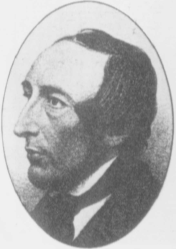John Martin (Young Irelander) facts for kids
John Martin (born September 8, 1812 – died March 29, 1875) was an important Irish activist. He first supported groups like Young Ireland and the Repeal Association, which wanted Ireland to have its own government. Later, he focused on peaceful ways to make changes, like helping tenant farmers. He eventually became the first Member of Parliament (MP) for the Home Rule League, representing Meath from 1871 to 1875.
Early Life and Activism
John Martin grew up in a land-owning Presbyterian family in Newry, County Down. His parents were Samuel and Jane Martin. He met John Mitchel, another famous Irish activist, when they were both at school in Newry.
John went to Trinity College, Dublin and earned a degree in 1832. He then started studying medicine. However, he had to stop in 1835 when his uncle passed away. John returned home to manage his family's land.
In 1847, the terrible Potato Famine deeply affected John. He joined John Mitchel in the Repeal Association, a group that wanted to end British rule in Ireland. He later left this group with Mitchel. John wrote for Mitchel's newspaper, The United Irishman. After Mitchel was arrested in 1848, John started his own newspaper called The Irish Felon. He also created "The Felon Club." This led to his arrest on July 8, 1848. John Martin was sentenced to 10 years of being sent away to Van Diemen's Land (now Tasmania, Australia).
Henrietta Mitchel
On November 25, 1868, John Martin married Henrietta Mitchel. She was the younger sister of his friend, John Mitchel. Henrietta shared John's political beliefs. After he died, she continued to campaign for home rule for Ireland. She believed this was important work that the Young Ireland movement had started. Henrietta died in Dublin on July 11, 1913, and was buried in Newry.
Time in Exile
John Martin arrived in Hobart, Tasmania, in November 1849. He was given a "ticket of leave," which meant he could live with some freedom in Bothwell. He promised not to try and escape.
While in Tasmania, John secretly met with other Irish exiles. These included Kevin Izod O'Doherty, Thomas Francis Meagher, William Smith O'Brien, and John Mitchel. John and Mitchel even lived together for a while. When Mitchel decided to escape, John chose to stay in Tasmania. He remained there until 1854, when he received a "conditional pardon." This allowed him to leave for Paris. He was given a full pardon in 1856 and returned to Ireland.
Later Life and Parliament
After returning to Ireland, John Martin became a national organizer for the Tenant Right League. This group worked to protect the rights of farmers who rented land. In 1860, he began writing for The Nation newspaper.
In 1864, he helped form the National League, which was mainly an educational group. He stayed in touch with John Mitchel, who was in Paris. John Martin did not agree with the Fenians' use of violence. However, in December 1867, he joined A M Sullivan in leading a symbolic funeral march. This march honored the Manchester Martyrs, who were Fenians executed in England. John was briefly arrested for this but the charges were dropped.
In December 1869, John Martin was in the United States. He was chosen by Isaac Butt and other Irish nationalists to run for a seat in Parliament. He ran against Reginald James Macartney Greville-Nugent in the Longford election. Greville-Nugent won at first, but the election result was canceled. This was because voters had been unfairly influenced. In a second election in May 1870, Butt's next candidate also lost.
These events showed the many different groups and ideas in Ireland at the time. There were struggles between different churches and between those who wanted big changes and those who wanted to keep things the same. Some wanted peaceful reform, while others wanted a revolution. Landowners and tenants also had different goals. John Martin, a Protestant landowner who wanted peaceful Home Rule, sometimes found himself agreeing with, and sometimes disagreeing with, more radical groups like the Fenians.
In January 1871, John Martin was elected to the British Parliament. He won the seat of County Meath by a large margin. He became the first Home Rule MP, representing Isaac Butt's Home Government Association, and later the Home Rule League. This was special because he was a Protestant elected in a mostly Catholic area. It showed how much people respected him. He was often called "Honest John Martin."
He kept his seat in the February 1874 general election. In Parliament, John Martin strongly supported Home Rule for Ireland. He also spoke out against laws that limited Irish freedoms. He died in Newry, County Down, in March 1875. He had given up tenant fees during tough economic times, which left him in poverty.
Charles Stewart Parnell took over John Martin's parliamentary seat for County Meath.
See also
- List of convicts transported to Australia
 | William M. Jackson |
 | Juan E. Gilbert |
 | Neil deGrasse Tyson |


